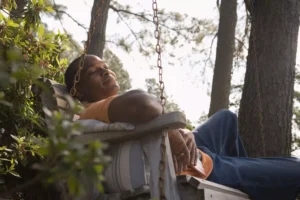In Flannery O’Connor’s short story “Revelation,” the main character, Mrs. Turpin, thinks she’s one of the good ones. She’s got her act together. Even on the outside, she’s wrinkle-free apart from her laugh lines, which themselves point to her external pleasantries. She has a good relationship with her husband, she keeps her farm in order, and she publicly sings gospel songs.
But one day, out of nowhere, Mrs. Turpin is accosted by a stranger in a waiting room and told that she is a warthog from hell. In disbelief that a good Christian woman such as herself could be associated with the likes of those in hell, Mrs. Turpin cries out to God. “Why me?” she asks. “[I] break my back to the bone every day working. And do for the church.”
On the surface, Mrs. Turpin has the appearance of goodness as she goes through the Christian motions. However, the reader learns that in her heart she has been measuring herself against others and has become prideful in her perceived superiority. Creating her own merit system, she has credited others with moral value points according to their socio-economic status, ethnicity, education and anything she deems to be good behavior. Of course, in her own system, she ranks well. But in God’s system, where she has exalted herself as a judge, she doesn’t.
Am I Mrs. Turpin?
When I was 22, I moved overseas to serve on the mission field. As I learned to live on a humble budget and share the gospel daily with people who had never heard it, my life was revolutionized. When I first returned to the States, I struggled when others didn’t understand my experiences. In ignorance, I judged them to be complacent and materialistic. Blind to my own sin, I gladly awarded myself heaps of moral brownie points for my life choices while mentally downgrading others who were led down alternate paths.
As believers, we can sometimes act like Mrs. Turpin. We group people according to tribes. We find the one we associate ourselves with (the good one, obviously) and point fingers at the others, puffing ourselves up. Like Mrs. Turpin, we thank God we’re the ones who have gotten it right. Like the Pharisee in Luke’s gospel, we say, “God, I thank You that I’m not like other people — greedy, unrighteous, adulterers, or even like this tax collector.” (Luke 18:11, HCSB). All the while, we’re blind to our own glaring sins of pride and self-righteousness.
Acknowledging our own self-righteousness is hard. It can feel like getting attacked out of nowhere in a waiting room. But as we cast our vision upward instead of inward, we realize that even our good works are sin-stained without God’s gracious intervention. It’s not our own righteousness, but that of Jesus Christ that saves us; that puts us all on an equal playing field.
As we journey to repent of our pride, it’s important to first recognize the areas in which we are trying to save ourselves. As I look at my own life, I find self-righteousness cropping up in the following ways.
Self-righteousness by theological doctrine.
It’s good to want to study God’s Word. As a seminary student and employee, I believe that theology is important. I can’t stress enough how vital it is to understand how God’s grand narrative fits together to tell the story of redemption in Christ Jesus. But we who operate in the theological sphere can be tempted to view our knowledge and beliefs as something that makes us superior to those with whom we disagree or people who are not as well-versed. I’ve had to be reminded that the number of books I’ve read and papers I’ve written has no correlation with my standing before God.
Self-righteousness by social justice advocacy.
As a trained social worker, it breaks my heart to see the exploitation of the vulnerable. More than that, I know it breaks God’s heart. Addressing the areas in which the church has become complicit in these grievances is important. But I can’t let my focus on the blind spots of others keep me from recognizing where I need to grow. Before God, we’re all sinners in need of the perfect advocate — Jesus Christ.
Self-righteousness by legalism.
The Bible gives us moral standards on which to base our lives. As we follow these directives, we glorify God. But sometimes we create additional regulations of our own and then discount others if they don’t abide by our rules. For example, someone else may not hold the same standards on entertainment choices or the issue of alcohol. As Christians, we must trust that the Holy Spirit is present in each of our lives when it comes to matters of discretion. Jesus is the only One who has fully kept the moral law, and each of us in the household of God is an equal beneficiary of His perfect righteousness.
Self-righteousness by liberty.
Burned by the legalism of previous generations, we millennials like to pride ourselves in our freedom in Christ. In the name of Christian liberty, we can be tempted to look down on those who take more conservative stances. We may feel more enlightened than the next Christian and frustrated by rules we feel are unnecessary. But true Christian liberty means the freedom to both partake and not partake in areas of choice, according to each one’s conscience and the prompting of the Holy Spirit.
The Older Brother
In his book “The Prodigal God,” Tim Keller unpacks the parable of the Prodigal Son. Though many focus on the sin and redemption of the younger brother in this story, Keller urges us to examine the story of the older brother. The religious audience Jesus spoke to would have identified more with the older brother, Keller points out. This brother, by outward appearances, was doing everything right.
Keller writes, “The targets of this story are not ‘wayward sinners’ but religious people who do everything the Bible requires. Jesus is pleading not so much with immoral outsiders as with moral insiders.” He continues, “Jesus’ purpose is not to warm our hearts but to shatter our categories.”
Like Mrs. Turpin, like the older brother, like the Pharisees, we need to shatter our categories and live in light of grace not thinking more highly of ourselves than we ought. Keller provides the answer to Mrs. Turpin’s question as to why she, a good person, was subjected to the painful realization of her own brokenness. He writes:
It is only when you see the desire to be your own Savior and Lord — lying beneath both your sins and your moral goodness — that you are on the verge of understanding the gospel and becoming a Christian indeed.
Lucky for us, both the younger brother and the older are invited to the father’s feast. The father tells his older child, “Son, you are always with me, and everything I have is yours” (Luke 15:31). When we repent of our sins and acknowledge that we have no true moral goodness of our own, Jesus promises to forgive us and be our righteousness. Our sin and subsequent salvation actually unite us with other Christians because we are all equally forgiven.
Collective Praise
At the beginning of O’Connor’s story, Mrs. Turpin doesn’t see her own deep spiritual void. Not until God shows her a vision of a heavenward processional in which her rankings are reversed does she realize her own need of God’s intervention in her self-righteous heart.
After her encounter with God, she finds herself one with “the voices of the souls climbing upward into the starry field and shouting hallelujah.” In the forgetfulness of herself, she finds true Christian freedom and unity with the body of Christ in the collective praise of the gospel of redemption.
I, too, have learned to see myself as an undeserving sinner, saved by God’s infinite grace. In this realization, I am free to fully love my brothers and sisters, diverse as our salvation stories may be, knowing that all are justified freely in Christ. In light of my own gracious redemption, I can fully and joyfully celebrate at the Father’s feast as He welcomes all of us to the table.
Copyright 2017 Juli Cooper. All rights reserved.










